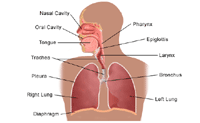The Lungs in Pregnancy
What makes up the respiratory system?
The respiratory system is made up of the organs involved in the interchanges of gases, and consists of the following:
Nose
Pharynx
Larynx
Trachea
Bronchi
Lungs
What is the function of the lungs?
The lungs take in oxygen, which cells need to live and carry out their normal functions. The lungs also get rid of carbon dioxide, a waste product of the body's cells.
The lungs are a pair of cone-shaped organs made up of spongy, pinkish-gray tissue. They take up most of the space in the chest, or the thorax (the part of the body between the base of the neck and diaphragm). The lungs are enveloped in a membrane called the pleura.
The right lung has three sections called lobes. The left lung has two lobes. When you breathe, the air:
Enters the body through the nose or the mouth
Travels down the throat through the larynx (voice box) and trachea (windpipe)
Goes into the lungs through tubes called main-stem bronchi
One main-stem bronchus leads to the right lung and one to the left lung
In the lungs, the main-stem bronchi divide into smaller bronchi
Then into even smaller tubes called bronchioles
Bronchioles end in tiny air sacs called alveoli
Does the respiratory system change during pregnancy?
Many changes occur in the respiratory system during pregnancy. Hormones and physical changes due to the growing fetus can affect the upper and lower respiratory tracts. Some of the common changes that occur in the respiratory system with pregnancy include the following:
Stuffy or runny nose and nosebleeds
Chest becomes barrel-shaped or increases in size from front to back.
Upward movement of the diaphragm, the large flat muscle used for respiration, located just below the lungs
Increase in the amount of air breathed in and out
Reduced lung capacity
Increased oxygen use
Because of these changes, many women feel short of breath or have some difficulty breathing as pregnancy progresses. When lung diseases develop or there is a pre-existing condition, such as asthma, the lungs may have difficulty compensating.

Connect with us:
Download our App: